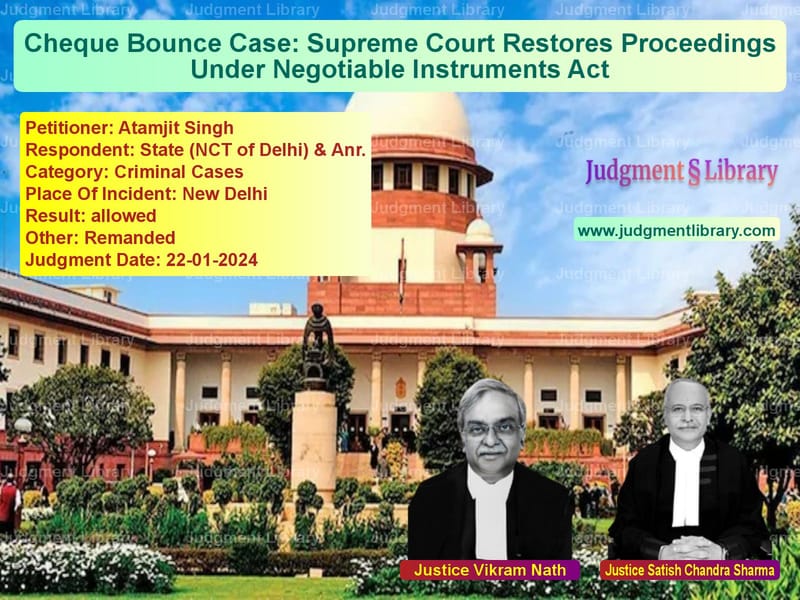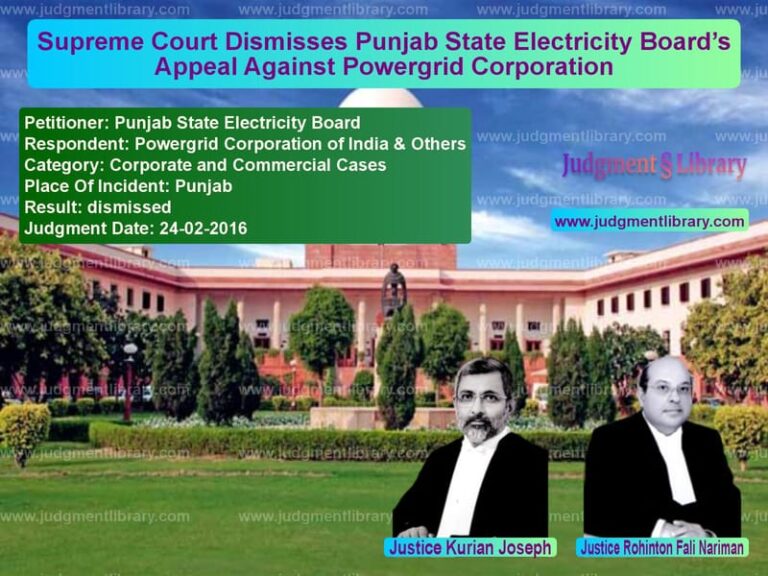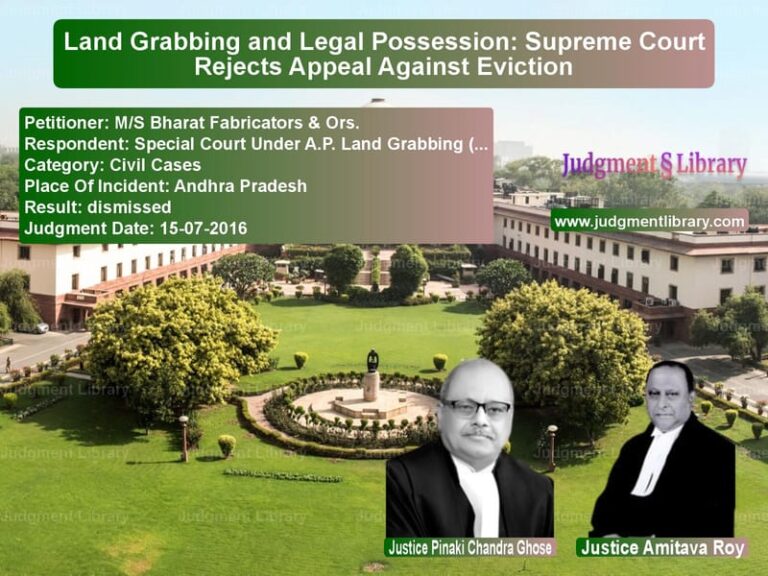Cheque Bounce Case: Supreme Court Restores Proceedings Under Negotiable Instruments Act
The Supreme Court of India, in its recent judgment dated 22 January 2024, addressed a critical issue related to cheque bounce cases under Section 138 of the Negotiable Instruments Act, 1881 (NI Act). The case, Atamjit Singh vs. State (NCT of Delhi) & Anr., revolved around whether a High Court could quash proceedings based on an alleged time-barred debt.
Background of the Case
The case originated when the complainant, Atamjit Singh, filed a complaint under Section 138 of the NI Act against the accused, Amrit Sandhu, regarding a dishonored cheque. The cheque in question, bearing number 329623 and dated 06.03.2017, was issued for Rs. 20,00,000 (Twenty Lakh Rupees) but was dishonored upon presentation.
The dispute arose from a financial transaction between the complainant and the accused, dating back to 2011. The complainant alleged that the accused owed him Rs. 20,10,000, and the dishonored cheque was issued to settle the debt.
High Court’s Decision
The Delhi High Court, in its order dated 06 September 2022, quashed the proceedings initiated against the accused. The High Court ruled that since the alleged debt arose in 2011 and there was no acknowledgment of liability between 2011 and 2017, the debt was time-barred under the Limitation Act, 1963. Consequently, the High Court held that the accused could not be prosecuted under Section 138 of the NI Act.
Petitioner’s Arguments
The complainant, Atamjit Singh, challenged the High Court’s ruling before the Supreme Court. His primary arguments were:
- The issuance of a cheque creates a legal presumption of liability under Sections 118 and 139 of the NI Act.
- Whether the cheque was issued for a time-barred debt is a matter of evidence and should be decided by the trial court.
- The High Court exceeded its jurisdiction under Section 482 of the Code of Criminal Procedure (CrPC) by quashing the proceedings at the summoning stage.
Respondent’s Arguments
The accused, Amrit Sandhu, defended the High Court’s decision, stating that:
- The transactions in question occurred in 2011, and the cheque issued in 2017 was related to a time-barred debt.
- Since there was no acknowledgment of debt in the intervening period, the liability ceased to exist.
- The prosecution under Section 138 of the NI Act was therefore unsustainable.
Supreme Court’s Ruling
The Supreme Court, consisting of Justice Vikram Nath and Justice Satish Chandra Sharma, overturned the High Court’s decision and restored the trial court proceedings.
Key observations of the Supreme Court included:
- The issuance of a cheque raises a statutory presumption of liability, which can only be rebutted by evidence.
- Whether a debt is time-barred is a mixed question of law and fact that must be decided during trial.
- The High Court’s interference at the summoning stage was premature and outside the scope of Section 482 of CrPC.
The Supreme Court relied on its previous ruling in Yogesh Jain vs. Sumesh Chadha, where it held that:
“Once a cheque is issued and upon getting dishonored, a statutory notice is issued. It is for the accused to dislodge the legal presumption available under Sections 118 and 139 of the NI Act.”
Based on this legal precedent, the Court ruled that the accused must present evidence at trial to establish that the cheque was issued for a time-barred debt. The High Court, therefore, erred in quashing the complaint at the preliminary stage.
Impact of the Judgment
This ruling strengthens the legal position that:
- A time-barred debt defense cannot be decided at the summoning stage.
- Section 138 cases must proceed to trial unless there is clear evidence of abuse of process.
- Accused persons must rebut the presumption of liability during trial, not through premature petitions under Section 482 CrPC.
Conclusion
The Supreme Court’s decision in Atamjit Singh vs. State (NCT of Delhi) & Anr. reaffirms the principle that cheque bounce cases must be adjudicated based on evidence. The judgment ensures that accused persons cannot escape liability at the outset by claiming that a debt is time-barred. By restoring the trial court proceedings, the Supreme Court upholds the integrity of Section 138 of the NI Act and protects the rights of creditors.
Petitioner Name: Atamjit Singh.Respondent Name: State (NCT of Delhi) & Anr..Judgment By: Justice Vikram Nath, Justice Satish Chandra Sharma.Place Of Incident: New Delhi.Judgment Date: 22-01-2024.
Don’t miss out on the full details! Download the complete judgment in PDF format below and gain valuable insights instantly!
Download Judgment: atamjit-singh-vs-state-(nct-of-delhi)-supreme-court-of-india-judgment-dated-22-01-2024.pdf
Directly Download Judgment: Directly download this Judgment
See all petitions in Fraud and Forgery
See all petitions in Cheque Dishonour Cases
See all petitions in Bail and Anticipatory Bail
See all petitions in Legal Malpractice
See all petitions in Contract Disputes
See all petitions in Judgment by Vikram Nath
See all petitions in Judgment by Satish Chandra Sharma
See all petitions in allowed
See all petitions in Remanded
See all petitions in supreme court of India judgments January 2024
See all petitions in 2024 judgments
See all posts in Criminal Cases Category
See all allowed petitions in Criminal Cases Category
See all Dismissed petitions in Criminal Cases Category
See all partially allowed petitions in Criminal Cases Category







